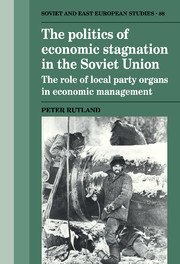 The Politics of Economic Stagnation in the Soviet Union
The Politics of Economic Stagnation in the Soviet Union Book contents
- Frontmatter
- Contents
- List of tables
- Preface
- Glossary of Russian terms and abbreviation
- Introduction: The party in the post-totalitarian system
- 1 The party and the economy: structures and principles
- 2 Party interventions in industry
- 3 Interventions in industry: case studies
- 4 The party as regional coordinator
- 5 Regional coordination: case studies
- 6 The party as fireman: party interventions in the transport and energy sectors
- 7 The role of the party in agriculture
- 8 Non-party control organs
- 9 The principles underlying the party's work with cadres
- 10 The obkom elite in the 1980s
- 11 Party and economy under perestroika
- Conclusion Party and economy in the USSR: from stagnation to collapse
- Appendices
- Notes
- Bibliography
- Index
- THE POLITICS OF ECONOMIC STAGNATION IN THE SOVIET UNION
Conclusion Party and economy in the USSR: from stagnation to collapse
Published online by Cambridge University Press: 06 July 2010
- Frontmatter
- Contents
- List of tables
- Preface
- Glossary of Russian terms and abbreviation
- Introduction: The party in the post-totalitarian system
- 1 The party and the economy: structures and principles
- 2 Party interventions in industry
- 3 Interventions in industry: case studies
- 4 The party as regional coordinator
- 5 Regional coordination: case studies
- 6 The party as fireman: party interventions in the transport and energy sectors
- 7 The role of the party in agriculture
- 8 Non-party control organs
- 9 The principles underlying the party's work with cadres
- 10 The obkom elite in the 1980s
- 11 Party and economy under perestroika
- Conclusion Party and economy in the USSR: from stagnation to collapse
- Appendices
- Notes
- Bibliography
- Index
- THE POLITICS OF ECONOMIC STAGNATION IN THE SOVIET UNION
Summary
This book set out to explore the role of the CPSU in the Soviet economic system, and to try to identify whether party interventions helped or hindered Soviet economic progress.
Our conclusion, based on an exhaustive reading of the relevant national newspapers and journals from the period 1975 to 1985, is that the economic stagnation which crept over the USSR during the Brezhnev era was in no small part due to the close monitoring of economic life exercised by the CPSU. The latticework of vertical and horizontal bureaucratic controls was so firmly established that managers were left with little room for manoeuvre. Efforts to expand the scope for market like forces, even on a modest scale, came to naught. This was not simply because of political opposition from conservative elements. It was more a case of the whole body politic rejecting the foreign cells of marketization, however modest, which local experiments or central reforms sought to inject.
There was a clear contradiction between the principles underlying party activities in the economy and the work of industrialists and farmers. The former had their own rules of the game, defined by the political logic of the CPSU – campaigns, slogans, orders, reports, reprimands, praise, initiatives, victories. The managers in turn had their own rules to follow, laid down by their ministry in Moscow. Their life involved petitioning for more resources, chasing down supplies, keeping their workers happy, and all with the goal of meeting output plan targets.
- Type
- Chapter
- Information
- The Politics of Economic Stagnation in the Soviet UnionThe Role of Local Party Organs in Economic Management, pp. 218 - 225Publisher: Cambridge University PressPrint publication year: 1992


